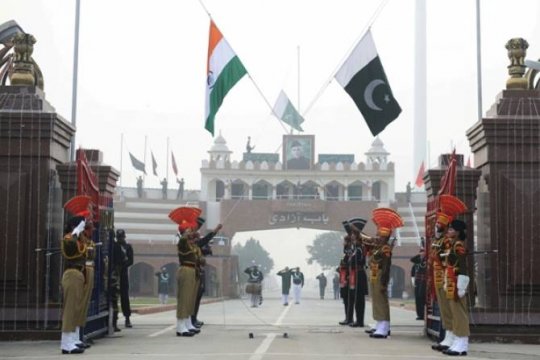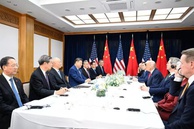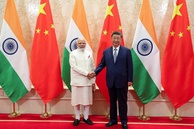The decision of the Indian authorities to abolish the special status of Jammu and Kashmir has caused a predictably angry reaction from Pakistan. Pakistani Prime Minister Imran Khan has signalled his country's readiness to use “all means available” [i] to counteract such a “unilateral” move on the part of New Delhi. Also, a statemetn condemning the decision has been made by Beijing. According to Pakistani media, Chinese Foreign Minister Wang Yi, while in Islamabad, “stated that China would oppose any unilateral actions by India in Kashmir which could worsen the situation in the region.” [ii] Later, amid reports of cancellation or postponement of the visits of high-ranking representatives of India and China to Beijing and New Delhi at the beginning of September, there appeared media reports about the possiblity of relations between the two countries deteriorating "over the situation in Jammu and Kashmir." What is happening in this region, which has been torn by geopolitical controversy for decades?
The territory of the former principality of Jammu and Kashmir has been an apple of discord between India and Pakistan ever since the end of the British colonial rule in 1947. Both countries claim full control over the region. Being in a state of war from the first days of independence, New Delhi and Islamabad have fought against one another four times; and three times over Kashmir [iii]. At present, India controls 45% of the historical territory of Jammu and Kashmir, where most of the population lives, and Pakistan - 35%. The remaining 20%, a barren and sparsely populated Aksaychin plateau, is under the control of the PRC. India considers Aksaychin an integral part of the historical region of Ladakh - the eastern part of Jammu and Kashmir, which is populated mainly by Buddhists. This gives India a reason for disputing it belonging to China. India also claims a territory in the north of Kashmir (northeast of Ladakh), which Pakistan transferred to the sovereignty of the PRC as part of the exchange of territories in accordance with the 1963 border treaty. What gives this region a particular importance is its role in the distribution of water resources of the Indus River basin, an important source of fresh water at the junction of the two most populated countries in the world, China and India, and Pakistan as well. Most of Kashmir’s 12 million residents are Muslims. For more than 30 years, they have been fighting fierce battles against the policies of the central authorities of India which they say are aimed to restrict the autonomy of the region and weaken the positions of the Muslim majority. India accuses Pakistan of training, arming and sending militants to Kashmir [iv].
On August 5th this year, the Indian authorities abolished the special autonomy of Jammu and Kashmir and created two union territories within its borders – two administrative units that enjoy fewer rights than a state and are controlled from the center. Jammu and Kashmir is in the western part of the former state, and Ladakh - in the eastern. The decision was effectuated through the Indian Parliament, by annulling Article 370 of the Constitution, which bestowed a special status on Jammu and Kashmir. As a result, the union territory of Ladakh has lost its own legislative body. In addition, they have lifted a ban on the purchase of land in Jammu and Kashmir by residents of other states of India, which has been in force for decades.
The decisions in question have triggered mass protests from local Muslims. The Indian authorities have brought in extra military and police units, increasing their total number to almost 540 thousand. They have also been blocking mobile communications and the Internet. A curfew was announced in a number of areas on September 8th . According to media reports, thousands of protesters have been detained [v]. Observers say, the decision on Kashmir is a “well-planned and well-prepared” step. However, they point out, the “redistribution” of power in favor of Prime Minister Narendra Modi’s Bharatiya Javat Party (BJP), as well as measures encouraging the migration of Hindus to Kashmir, will surely encourage radical groups that have been fighting against India from the territory of Pakistan.
So drastic and unpredictable by their aftereffects, the moves taken by Narendra Modi can be accounted for by a whole range of internal and external factors that are closely intertwined. After the February 14 terrorist attack in the Jammu and Kashmir region of Pulwam, which became the bloodiest single-blow terrorist attack in the last 30 years, the issue of "foreign policy and national security" for the first time in Indian history became one of the features of the spring election campaign to elect new members of parliament. The retaliatory strike against Pakistan has become the predictable reaction of the Indian Prime Minister to "the Indian society’s demand of tough measures against the sponsors of terrorism." Besides, in the midst of the election campaign, the prime minister helped to reverse the emerging tendency towards the strengthening of the positions of the party’s political opponents. The "power" measures contributed to the consolidation of voters around the prime minister and cemented the positions of the BJP in parliament. In the case of Kashmir, a number of observers see Modi’s measures as aimed to divert the attention of the Indian society from the worsening economic situation and rising unemployment [vi].
Another factor is the long-nurtured plans of the Indian leadership to centralize the state and consolidate the country. Without this, as they say in the Indian establishment, it is impossible to upgrade and strengthen national might, including in international affairs. From the domestic point of view, these plans are designed to ensure the growth of Hindu national-religious identity. Without eliminating the only predominantly Muslim state, it is difficult to talk about the ultimate goal of the BJP and the forces supporting it - the proclamation of India as a Hindu nation. The strengthening of such tendencies in the Indian leadership will inevitably lead to tougher measures against Pakistan. Islamabad was quick to condemn the decision to abolish the autonomy of Jammu and Kashmir, describing it as “a gross violation of international law and the rights of ordinary Kashmiris,” “and refused to recognize it as an internal affair of India.” [vii] Meanwhile, the military escalation that took place last February demonstrated how quickly the flames of war flare up between old enemies. Given the situation, there have sprung up more fears that a new Indian-Pakistani conflict could deteriorate into an exchange of nuclear strikes. However, according to realists, it is precisely the prospect of mutual nuclear destruction that should stop the two parties from allowing an "excessive" escalation of military conflict at the moment. And it will continue to keep them from going over the line in the future.
The interests of New Delhi and Islamabad clash not only in Kashmir, but also to the north of it - in Afghanistan. According to experts from the US Stratfor Center, US negotiations with Taliban, a movement banned in the Russian Federation, on prospects for the withdrawal of most of the American troops, potentially contribute to the strengthening of Pakistan’s geopolitical standing. A stronger position of New Delhi in Kashmir should become a counterbalance to a stronger position of Pakistan in Afghanistan and, as a result, should add to the consolidation of Islamabad’s resources in confrontation with India. In this respect, it seems that the “reformatting” of Kashmir appears yet another milestone in a series of steps demonstrating that India has a political will and intends to dictate its terms to the other side; including using its advantage in conventional weapons. At the same time, in case of failure of a new conventional military escalation with Pakistan, we will not talk about returning to the status quo, but about the deterioration of India's position; and it will give a new impetus to the Pakistani policy of tacit approval of terrorist attacks on India [viii].
The Chinese factor attaches a relatively new but significant reality to the Kashmir issue. In recent years, Beijing has become a major strategic ally of Islamabad. The China-Pakistan Economic Corridor (CPEC), which runs through the diputed territory of northern Kashmir, is key to the success of the Road and Belt Initiative. It provides alternative access route to the Indian Ocean, bypassing the potentially vulnerable to blockade waters of Southeast Asia and the South China Sea. Finally, the dispute with New Delhi over the ownership of the Aksaychin Plateau, an area covering 42,685 km² located on the border of China, Pakistan and India, is also dragging Beijing into the territorial problems of Kashmir.
Meanwhile, China has an objective need, if not for full normalization, then for stabilization of relations with India. First of all, Beijing is concerned about the potential participation of New Delhi in the creation of anti-Chinese coalitions in Asia. In the event of a new war between India and Pakistan, Beijing will find itself in a difficult position. By supporting Pakistan, China risks throwing India into the arms of the United States. Supporting New Delhi will jeopardize many of its strategic projects in South Asia and Eurasia as a whole, as the implementation of these projects largely depend on the Pakistani port of Gwadar. In addition, it will set the stage for Islamabad’s return to the bosom of Washington. On top of all that, it would also be difficult for China to act as an intermediary for the parties involved, first of all, due to its "special" relations with Islamabad, which cause growing suspicion within the Indian elite.
Therefore, the decision to centralize power in the former Jammu and Kashmir was seen by a number of Indian experts quoted by Deutsche Welle as speaking of New Delhi’s concern over the “growing presence” and influence of the PRC in Ladakh. It was also described as an intention to draw the attention of the metropolitan bureaucracy to the problems of the region. Beijing's initial reaction to the decision of the Indian authorities was fairly harsh. On August 16th, China secured a discussion on Kashmir in the UN Security Council. But the discussion was held behind closed doors in the format of “consultations” in which the Security Council called on both sides to resolve problems through bilateral dialogue. Neither a formal meeting was convened nor an official statement was issued. A number of commentators classified the discussion as “lukewarm”, or neutral, by nature. [ix].
The intention of leading powers, as well as the entire international community, to avoid direct involvement in a long-standing and extremely complicated territorial dispute, clearly discourages the leadership of India and Pakistan. And China, even despite the actual threats against it from one of the members of the Indian Cabinet [x], was allowed to speak out in favor of resolving the Kashmir dispute between India and Pakistan "on a bilateral basis." That de facto supports the status quo provided by the Indian-Pakistani Declaration of 1971, according to which, controversial issues in bilateral relations should be resolved solely between India and Pakistan, without involving other states.
New Delhi and Islamabad, while continuing to publicly exchange harsh statements and threats, are unofficially trying to enlist the support of Beijing, Moscow and Washington. However, the United States has said that its policy in the region remains intact. Washington has also given up on the initial idea of acting as an intermediary between India and Pakistan. Russia has supported New Delhi, reiterating its commitment to resolving the Kashmir problem in a bilateral Indian-Pakistani format [xi]. Pakistan’s traditional allies, including China, have distanced themselves from the Kashmir problem. [xii] China has formally accepted India’s assurances that its actions in Kashmir are not aimed against the interests of China. The tough diplomatic rhetoric between China and India in the first weeks after New Delhi’s decision to eliminate autonomy for Jammu and Kashmir were replaced by a search for ways to ease tensions in course of consultations among middle-level officials [xiii]. So far, there have been no reports of Beijing's intention to disavow the Wuhan format and cancel a visit by Chinese President Xi Jinping to India which is scheduled for October this year.
Neither Moscow, nor Beijing, nor Washington, though for different reasons, can mediate between India and Pakistan. All three direct participants in the disputes over Kashmir are of tremendous importance for foreign policies of both Russia and the United States. Pakistan does not fully trust Russia, India does not trust China, while the United States does not enjoy the trust of either New Delhi, or Islamabad, or Beijing. And none of the external powers is interested in an escalation of the Indian-Pakistani conflict. Therefore, it is likely that, sooner or later, a compromise will be found, that is, a solution that will return the region to stability, whichever is possible under the current circumstances. But this compromise will likely leave everyone dissatisfied.
The opinion of the author may not coincide with the position of the Editorial Board
[i] https://www.reuters.com/article/us-india-kashmir-pakistan-idUSKCN1VR0H0
[ii] https://regnum.ru/news/polit/2714061.html
[iii] В1947—1949 годах, в 1965-м и в 1999 году.
[iv] http://www.ng.ru/world/2019-09-08/5_7670_training.html
[v] https://foreignpolicy.com/2019/09/09/detained-in-kashmir/
[vi] According to the IMF, at the beginning of autumn, the economic growth rate fell to its lowest level in the last six years; unemployment, according to the Center for Monitoring the Indian Economy (CMIE), has reached its highest level in the last three years.
[vii] https://regnum.ru/news/polit/2714061.html
[viii] https://thediplomat.com/2019/02/india-pakistan-crisis-exposes-modis-dilemma/
[ix] https://www.dw.com/en/kashmir-is-the-un-security-council-reluctant-to-get-involved/a-50061172
[xi] http://www.mid.ru/web/guest/foreign_policy/news/-/asset_publisher/cKNonkJE02Bw/content/id/3764347#26
[xii] https://www.dw.com/en/how-far-will-china-go-to-support-pakistans-position-on-kashmir/a-49993550
read more in our Telegram-channel https://t.me/The_International_Affairs

 11:04 23.09.2019 •
11:04 23.09.2019 •



























